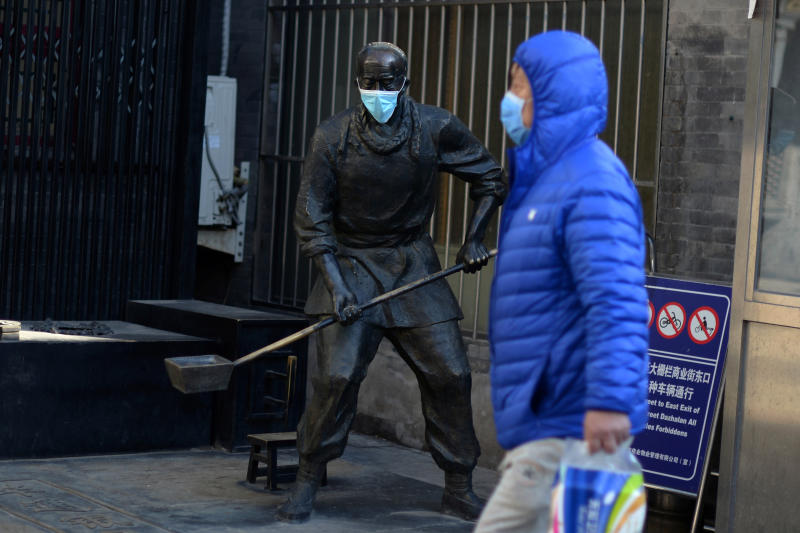China takes its courts online as coronavirus outbreak drags on
Sign up now: Get insights on Asia's fast-moving developments

A man wearing a face mask walks past a statue with a face mask on near the Qianmen pedestrian street in Beijing, China, on Feb 18, 2020.
PHOTO: REUTERS
HOHHOT (XINHUA) - The people's court of Hainan district in northern China's Inner Mongolia autonomous region heard a case on Monday (Feb 17), with only a judge and a court clerk in attendance.
To prevent the gathering of people, the "contactless" trial was conducted through a video call with separate computer screens presenting images of the judge, public prosecutor and defendant.
The defendant was charged with obstructing public affairs, as he had refused to cooperate with epidemic prevention and control personnel and abused and injured a law enforcement officer a few days ago.
With all legal procedures completed online, the public prosecutor attended the trial in an office of the procuratorate when the defendant was standing in custody with two policemen behind him.
As the epidemic outbreak continues to disrupt life in China, courts in the country, following schools and enterprises, are using the Internet to reduce the flow of people and curb the spread of the virus.
In eastern China's Zhejiang province, the higher people's court has required courts at all levels in the province to give priority to guiding parties to file cases, contact judges, submit materials, hold court sessions or mediate online during the epidemic.
On Jan 29, the higher people's court of Beijing required the capital's courts to make full use of the online case-handling system and guide parties to use online information platforms for litigious activities.
"We were fully prepared before the online hearing and conducted operational training for all parties in advance to guarantee everything went smoothly," said Chen Shi, a judge of Beijing's No. 1 Intermediate People's Court, who presided over a "contactless" trial recently.
According to Chen, an online trial with synchronous audio and video recording takes less than 40 minutes.
"The parties will be notified through short messages once the judge makes an online appointment for a trial that can be participated in via laptops and mobile phones," said Li Xiang, assistant director of the technical department of the higher people's court of Beijing.
"An online video trial can have up to eight people at the same time, with parties able to provide evidence and cross-examine online. The whole process is recorded through voice recognition, and after the hearing, the parties can scan a QR code to create electronic signatures of the trial transcripts," Li said.
Beijing's online trial system can now support 200 courts holding sessions at the same time, and the number is expected to reach 800.
China set up its first Internet court in the eastern city of Hangzhou in August 2017, followed by the establishment of similar courts in Beijing and Guangzhou in September 2018.
Internet courts in Hangzhou, Beijing and Guangzhou had accepted close to 120,000 cases as of Oct 31, 2019, reducing the time of handling cases by nearly 50 per cent, according to a white paper released by the Supreme People's Court.
On average, it took 45 minutes for online hearings and 38 days to conclude a case. Up to 98 per cent of the parties accepted first-instance judgements without appeal.
From last March, the railway transportation intermediate court of Hohhot, capital of Inner Mongolia, started to carry out online filing and remote court hearing and mediation.
"Considering the current situation of the epidemic outbreak, we will further intensify our application of online trials to provide efficient, convenient and safe judicial services to the public," said Wang Xujun, head of the railway transportation intermediate court of Hohhot.


